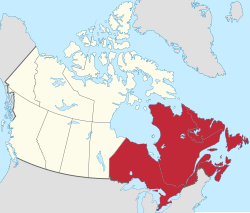Eastern Canada: Difference between revisions
m Task 18 (cosmetic): eval 1 template: hyphenate params (1×); cvt lang vals (1×); |
No edit summary |
||
| Line 26: | Line 26: | ||
| subdivision_name4 = |
| subdivision_name4 = |
||
<!-- maps and coordinates --> |
<!-- maps and coordinates --> |
||
| image_map = Eastern Canada.svg |
| image_map = Eastern provinces in Canada.svg |
||
| map_caption = Eastern Canada ( |
| map_caption = Eastern Canada (red) within the rest of Canada (tan) |
||
| pushpin_map = |
| pushpin_map = |
||
| pushpin_relief = |
| pushpin_relief = |
||
Revision as of 21:30, 7 January 2021
Eastern Canada
Est du Canada (French) | |
|---|---|
 Eastern Canada (red) within the rest of Canada (tan) | |
| Country | Canada |
| Provinces | New Brunswick, Newfoundland and Labrador, Nova Scotia, Ontario, Prince Edward Island, Quebec |
| Area | |
• Total | 2,783,400 km2 (1,074,700 sq mi) |
| Population (2016) | |
• Total | 23,946,177 |
| • Density | 8.6/km2 (22/sq mi) |
Eastern Canada (also the Eastern provinces or the East) is generally considered to be the region of Canada east of Manitoba, consisting of the following provinces:
Ontario and Quebec define Central Canada, while the other provinces constitute Atlantic Canada. New Brunswick, Nova Scotia and Prince Edward Island are also known as the Maritime Provinces.[1]
Capitals
Ottawa, Canada's capital, is located in Eastern Canada, within the province of Ontario.
The capitals of the provinces are in the list below:
- New Brunswick - Fredericton
- Newfoundland and Labrador - St. John's
- Nova Scotia - Halifax
- Ontario - Toronto
- Prince Edward Island - Charlottetown
- Quebec - Quebec City
Definitions
The Canadian Press defines Eastern Canada as everything east of and including Thunder Bay, Ontario.[2]
Population
The total population of this region is about 23,946,177 in 2016, or about 70% of Canada's population. Most of the population resides in Ontario and Quebec. The region contains 3 of Canada's 5 largest metropolitan areas, Toronto being the fourth largest municipality in North America.
- Largest metropolitan areas
- Toronto, Ontario - 6,254,191
- Montreal, Quebec - 4,098,927
- Ottawa-Gatineau, Ontario-Quebec - 1,568,381
- Quebec City, Quebec - 807,200
- Hamilton, Ontario - 536 917
- London, Ontario - 474 786
- St. Catharines-Niagara, Ontario - 447,888
- Kitchener, Ontario - 441 380
- Halifax, Nova Scotia - 403,131
- Windsor, Ontario - 329,144
- Sherbrooke, Quebec - 212,105
- St. John's, Newfoundland and Labrador - 205,955
The population of each province in 2016, from greatest to least is here:
- Ontario - 13,448,494
- Quebec - 8,164,361
- Nova Scotia - 923,598
- New Brunswick - 747,101
- Newfoundland and Labrador - 519,716
- Prince Edward Island - 142,907
Politics
Eastern Canada is represented by 213 Members of Parliament out of the 336 (106 in Ontario, 75 in Quebec and 32 in the Atlantic Provinces) and 78 senators out of 105.
See also
References
- ^ "Maritime Provinces". The Canadian Encyclopedia. Retrieved 8 November 2015.
- ^ Canadian Press Style Guide. Canadian Press. 1995. p.471
47°11′22.96″N 70°8′12.19″W / 47.1897111°N 70.1367194°W
External links
![]() Media related to Eastern Canada at Wikimedia Commons
Media related to Eastern Canada at Wikimedia Commons
![]() The dictionary definition of Eastern Canada at Wiktionary
The dictionary definition of Eastern Canada at Wiktionary
